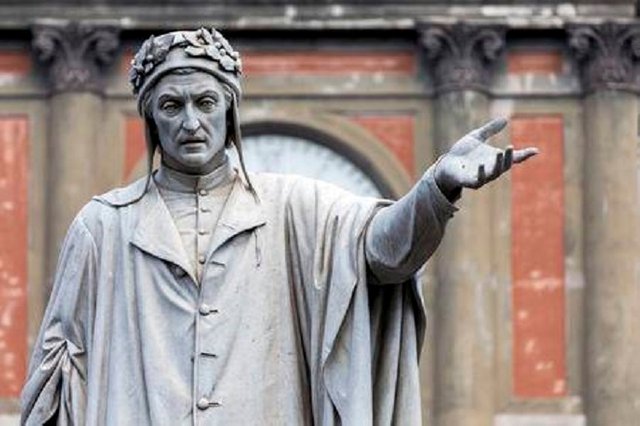At the end of the second part, Dante confessed that he shares the traditional theological notion of the immortality of the human soul and he said that of all sorts of humankind, the stupidest, the slightest, and the worst, is to believe that after this life there is no another life. In fact, if we pass through all the writings of both philosophers and wise men and writers, we will find that they are alike in the fact that they all claim that there is something transient in our people ... We can not see perfectly the immortality, because the immortal is mixed with the corruptible in us. We can clearly see immortality only through faith, because by reason we see it through the impenetrable curtain that is formed by the intertwining of the immortal and the dead in our nature.
The third part of "Feast" is very closely related to the previous second part. The presbytery before her praises the merits of the Noble Queen, which is a personification of philosophy. This lady is represented consecutively as the angel-woman, as a descending woman from heaven who makes miracles and gives bliss. The chief vocation of the noble lady is to give people nobility, to strengthen their faith, to help them achieve the true purpose of human life-eternal happiness that is bound up with the continual dedication to the contemplation of God's wisdom. Here, with his reflections, the writer of the Feast is a sub-branch of a new type of religious culture, which gives priority to the achievement by the individual of greater independence from the dominant authorities / feudal and religious / in making his / her own morality. Further on in the third part, the poet defends the important place in the soul's peace of love. It is firmly convinced that Earth is the center of the universe that the universe dominates a hierarchical order in which the causes naturally give rise to the consequences. In his quest to defend his own glory, Dante overcame the possible accusations that he has very quickly replaced his League of Things (Beatrice) with the love of his mind (Philosophy).
In this part of the Feast, Dante asserts the Master (Aristotle) thesis that "reason is the most noble core of the human soul." Developing the insights of the ancient Greek philosopher, the Italian thinker argues that human reason is built up by the four manifestations of virtue: the virtue of giving knowledge, the mentoring virtue, inventing virtue and appreciating virtue. He assumes that besides these four "most noble virtues", human reason also contains a number of others that make it the "most elevated and noblest ingredient of the soul. Burkhart argues that Dante derives from Aristotle's notion of nobility - "The nobleman's family rests on superiority and inherited wealth" - its definition: "The noblemanhood rests on its own superiority or that of the ancestors." But Dante is no longer satisfied with this. He reproaches that even in paradise in conversation with his ancestor, Kachagwida has mentioned the noble ancestry, which is, however, only a mantle, from which the time constantly tears pieces, unless one adds a new value to it every day. And in "Feast", he almost totally breaks the noble nobility from any birth-related condition and identifies it with the pledge of any moral and intellectual advantage; it places special emphasis on higher education, believing nobilita to be the sister of philosophy. In the penultimate part of the Feast, Dante asserts an original, typically Renaissance concept of the independence of the nobility of wealth: "I support the claim that wealth can not yield nobility, as some thinkers have previously suggested. And to prove that wealth differs too much from nobility, I claim that wealth can not take the nobility of the one who owns it. It also can not provide it to him, as wealth is low, and inferiority is the opposite of nobility.

You have recieved a free upvote from minnowpond, Send 0.1 -> 10 SBD with your post url as the memo to recieve an upvote from up to 100 accounts!
Downvoting a post can decrease pending rewards and make it less visible. Common reasons:
Submit
Downvoting a post can decrease pending rewards and make it less visible. Common reasons:
Submit